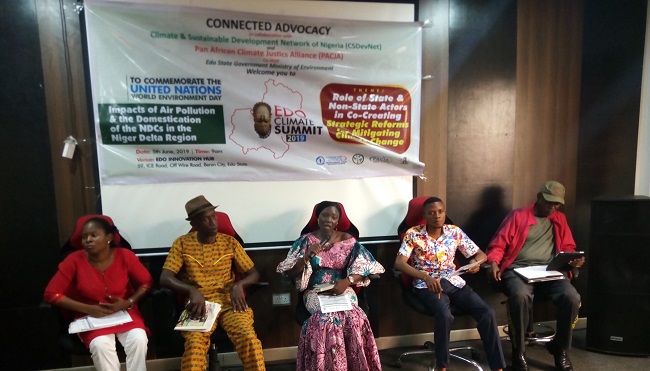To commemorate the 2019 World Environment Day, Connected Advocacy for Empowerment and Youth Development Initiatives in collaboration with Climate and Sustainable Development Network of Nigeria (CSDevNet) and the Pan African Climate Justice Alliance (PACJA) organised the first ever Edo Climate Summit. The daylong event was themed: “The Role of State and Non-State Actors in Co-creating Strategic Reforms in Mitigating Climate Change”.

The event which recorded appreciable turnout of participants from the government sector, private sector, civil society, academia, and the media, was aimed at strategizing and brainstorming on the possible ways to mitigate the adverse effects of climate change in Edo State in particular and other Niger Delta states in general.
In an opening speech, the Convener and Executive Director of Connected Advocacy, Prince Israel Orekha, stated that the forum was aimed at creating awareness about the relevance of preserving nature and the environment. He stressed that it is part of United Nations recommendations under the Paris Agreement that individual countries to safeguard the health of the public and the environment by reducing greenhouse gas (GHG) emission, thus combating global warming through commitment and actions.
He however underlined the need to advance knowledge and transform lives through high impact innovative teaching, awareness raising, local content development and outreaches activities, which he noted would go a long way to enhance citizens’ readiness to tackle the impact of climate change.
He admonished the federal and state governments on the need to have air quality and emission legislations that require capital expenditure, pointing out that there is the need to develop a safe pathway to tackle energy poverty and reduce air pollution. He underscored the need to educate community on the impact of climate change and continued behavioral change, and energy conservation.
The summit had two plenary sessions that dealt exhaustively on climate change. The first session which had five panelists drawn from different sectors focused on: “Climate change adaptation and mitigation reforms in Edo and other Niger Delta states”, wherein panelists gave an overview about climate change while emphasising the possible ways through which natural course and human actions can lead to global warming.
Assistant Director in the Ministry of Environment and Sustainability, Mrs Blessing Egharevba, who was a panellist, posited that wastes should be sorted out and recycled rather than indiscriminately burnt. She warmed against deforestation as well, stating that it can lead to the depletion of the ozone layer which can result in excessive heat which can adversely affect humans.
Another panellist, Isaac Noble, urged community leaders to be mindful of environmental laws when allocating lands both for farming and building purposes. He further advocated for the creation of awareness in the rural and urban areas.
The second stage of the panel section discussed “The Role of State and Citizens in Environmental Protection” in respect of which the panellists, while analysing government’s role in protecting the environment, expressed the belief that one of the ways government can protect the environment is to implement those enabling laws governing it, introducing climate change in school curriculum as well as providing alternative source of energy (clean energy) to consumers.
Efforts should also be made by the government to discourage indiscriminate felling of trees and constant burning of fossil fuel which affects the atmospheric conditions adversely, they suggested.
The panelists urged the citizenry to stop using appliances that generate heat and also reduce burning of waste. More importantly, plastic wastes should not be disposed in unauthorised places, while joining in the campaign for tree planting, energy conservation emission reduction.
At the end of the programme, a communique was drawn which emphasised on the possible ways the adverse effects of climate change can be mitigated. One of such resolutions contained in the communique is for the the government to embark on a massive awareness campaign in both rural and urban areas, educating the citizenry on the devastating effect of climate change and the need for precautionary measures to mitigate its effects.
